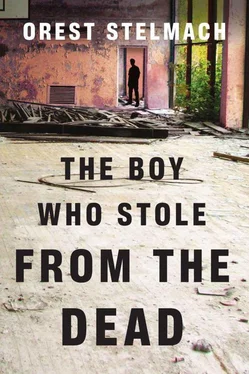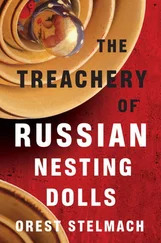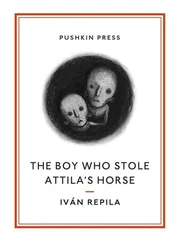When they got near the village, the driver guided the jeep off the road. He stopped on a knoll overlooking a green field surrounded by a tree line on all four sides. It stretched hundreds of yards in each direction. Clusters of wildflowers and bushes sprang from valleys and sinkholes where water gathered.
The guide said the cave was officially known as “ Ozero ,” the Ukrainian word for “lake.” Locally, however, it was called Popowa Yama , or the Priest’s Grotto.
“It’s the largest of the caves that make up the Gypsum Giant,” the guide said, as he unloaded their supplies from the back of the jeep.
“Gypsum Giant?” Marko said.
“The Ukrainian system of natural caves. Not to be confused with the Caves Monastery in Kyiv, which was built by men. Five hundred fifty kilometers long. Second longest cave network in the world.”
Marko whispered in Nadia’s ear. “What’s with all the underground action in this country?”
“Maybe life has been less than kind above ground,” Nadia said.
“The Gypsum Giant is a crystalline structure,” the guide said. “The crystal cracks like glass. So you have precise arteries but with jagged edges. That means we know where we’re going but it can be dangerous.”
They put on yellow overalls, helmets with chinstraps and mounted headlamps, knee pads, and elbow pads.
“Are we really going to need these pads?” Marko said, as he worked one over his forearm.
“Probably not,” the guide said. “But in case your friend has gone farther than most folks, it’s best to be prepared.”
The guide handed each of them a knapsack containing two flashlights, spare batteries, bottled water, a pocket knife, a variety of plastic bags, a candle, a lighter, a roll of toilet paper, and an empty jar with a seal.
“The original entrance to the cave is filled with weeds and debris. We’ll use a secondary entrance instead.”
They hiked a hundred yards to a patch of shrubs and small trees. A shaft protruded four feet above ground. The guide strained to lift a manhole cover. Nadia and Marko peered inside.
Rusty metal pipes formed a ladder that disappeared into a black hole. A sense of dread gripped Nadia. She remembered her experience evading Kirilo Andre in Kyiv’s Caves Monasteries. She didn’t like tight places a quarter mile beneath the Earth.
The guide shined the light. “The ladder is made out of gas pipes,” he said. “There are three of them. Each one is two meters long. So we will go down one at a time, about six meters deep. I will be last. I will close the cover.”
“Can’t you take the lead?” Marko said. “I’ll go last. I’ll close the entrance.”
“I can’t let you do that,” the guide said. “I need to know you’re both on solid ground before the cover is closed. If I go first, I can’t be above ground to help you in the unlikely event something goes wrong.”
Nadia lowered herself onto the first horizontal pipe and descended into the shaft. She hugged the ladder as she stepped down, her face almost kissing the dirt between the rungs. The Caves Monastery in Kyiv had a staircase. A year ago that staircase had felt like a portal into darkness. Now it seemed like a resort experience.
She focused on her breathing. Counted the rungs. Each pipe measured three meters. That was about three yards. Nine feet. Nine rungs per pipe. Three pipes. Twenty-seven steps down.
Marko’s voice echoed down the shaft. “You counting in English or Uke?”
Nadia stopped. Her heart thumped in her ears. “What’s the difference?”
“Numbers are a little longer in Uke. You’ll make it down faster if you count in English.”
The dialogue caused her to lose count. She swore under her breath. Took a deep breath and continued. When her right foot touched ground she lifted it and dropped it again. To make sure she wasn’t imagining the sensation.
She stepped forward into a passageway. The walls were wide enough for two people to walk side-by-side but the ceiling was only four feet high. She had to stoop.
“Done,” she said, looking up into the light.
“Move into the cave,” the guide said. “So nothing falls on you.”
So no one falls on her, Nadia thought.
Marko descended next. After he joined her in the cave, the guide closed the shaft behind him.
Darkness enveloped them. They took turns aiming their headlamps at each others’ knapsacks and removed their flashlights. The guide scurried down the ladder with frightening speed, sliding down the last pole without touching a rung.
“Our destination is the “ Khatki ,” he said.
“ Khatki ?” Nadia said. “The Ukrainian word for ‘little cottage.’ ”
The guide pulled out his flashlight. “That’s where the families lived.”
“What families?” Marko said.
“The ones that hid from the Nazis,” the guide said.
He took off before Nadia could ask questions. She and Marko followed. Shards of crystal hung from the ceiling. Gypsum crystal covered rocks. Water rolled down walls. Nadia brushed aside a sense of claustrophobia.
The cave’s height gradually increased until they could walk upright. They weaved their way a hundred yards through a labyrinth of passageways to an open area. It was the shape of a diamond and the size of a living room. Beyond it the floor of the cave pitched upward and the ceiling soared. The forward chamber’s soaring height created the illusion that the outdoors lay ahead.
“We’ll rest here for a moment,” the guide said. “Drink some water.”
They took off their packs, sat down on rocks, and drank from their bottles.
“People hid from the Nazis in here?” Nadia said.
“Three Jewish families,” the guide said. “Thirty-eight people. They spent three hundred and forty-four days under ground. They had three separate living chambers. A ventilated cooking chamber. They lit candles for only a few minutes a day so they wouldn’t be seen.”
“How did they get supplies?”
“They found a water supply in a chamber of the grotto on the east side. This cave is called ‘ ozero ’ for a reason. As for food, a Ukrainian farmer kept them alive.”
“A Ukrainian farmer? A gentile?”
“Yes. He brought food to designated places outside the cave at pre-arranged times. Weekly, for almost a year. Until one day when the men went out to get the food and there was none. Instead there was a piece of paper. On the paper was a message. The message read: ‘The Germans have gone.’ ”
“What happened to the families?” Nadia said.
“When they stepped into daylight for the first time, a four-year-old girl asked her mother to extinguish the candle. It was too bright for her eyes, she said. She was so young she’d forgotten daylight. The families ended up in displaced person camps in Germany. Then they went to Canada and America and started their lives all over again.”
Nadia enjoyed a rush of adrenaline. She sipped her water, replaced it in her knapsack, and stood.
“Let’s go,” she said. She held the map in her left hand and a flashlight in her right. “Which way?” she said to the guide.
There was only one direction to go. Nadia marched onward.
Marko and the guide sprang into action.
“Hey, Nancy Drew,” Marko said. “What the heck?”
The guide took the lead. Nadia and Marko followed him for another ten minutes.
The guide stopped in front of a cracked rock. The fissure was no more than six inches long.
“In other parts of the caves, the cracks are so wide they can swallow a person,” the guide said. “Always watch your step. The scientists have done studies on the cracks. They are as much as two and a half kilometers deep. You fall. You die.”
Читать дальше












